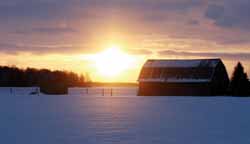County Is A Leader In Oats Production
Potatoes may be king as far as Langlade County farmland, but the success of spuds here is due to a careful crop rotation that has led to the region becoming a leader in other areas as well.
Recent numbers from the National Agricultural Statistics Service suggest that Langlade County is the oats capital of Wisconsin.
And it produces plenty of winter wheat as well.
It’s all due to preserving soil health, Marie Graupner of the Langlade County Land Conservation Department said. We need that rotation in the soil in order to maintain its health for other crops that will be grown there in the future.
And that has led to a surprisingly diverse agricultural economy.
According to the statistics service, in 2015 Langlade County produced 978,000 bushels of oats, far out-yielding second-place Manitowoc County at 904,000 bushels and Marathon, 904,000 bushels.
Yields in Langlade County were 90 bushels per acre, second only to Washington at 99 bushels per acre and tied with Dodge.
Langlade County had 11,200 acres planted in oats, with 10,800 acres harvested. Total statewide 280,000 acres planted, with a harvest of 14 million bushels.
In 2015, Langlade County also saw 2,200 acres planted in winter wheat, with 2,070 acres harvested. Yield was 66.7 bushels per acre, or 138,000 bushels total.
Dane was the largest wheat producer in the state with 1.16 million bushels produced from 14,000 harvested acres. Yield there was 79.7 bushels per acre.
Graupner said Langlade County is unique in that farmers and growers often swap fields, allowing for crop rotations that benefit the users while preserving the soil.
Farmers with dairy or beef cattle will rotate their valuable alfalfa crop with oats or wheat while potato growers will plant fields in corn, followed by wheat or oats and then spuds.
It’s regular rotation, she said. There are a mix of uses out there with everyone working together.
Source: Antigo Daily Journal

